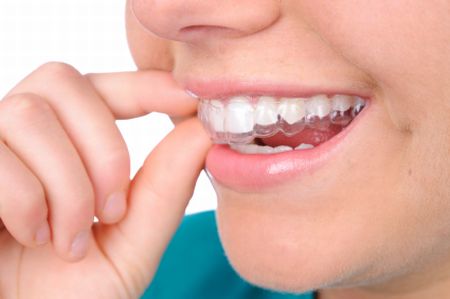Helpful Retainer Habits
January 18th, 2021
 We’ve probably all seen that unhappy kid or frazzled parent sifting through trash for a lost retainer. If you're really unlucky, YOU might have been that unhappy kid or frazzled parent sifting through the unpleasant remains of third period lunch hour. But getting tossed isn’t the only risk these appliances face. Read on for ways to keep your retainer (and your parent!) happy.
We’ve probably all seen that unhappy kid or frazzled parent sifting through trash for a lost retainer. If you're really unlucky, YOU might have been that unhappy kid or frazzled parent sifting through the unpleasant remains of third period lunch hour. But getting tossed isn’t the only risk these appliances face. Read on for ways to keep your retainer (and your parent!) happy.
Keep Your Retainer with You
Always carry a retainer case. If you automatically put your retainer in its case when you’re eating, you are much more likely to remember it then if it has been wrapped up in a napkin on your lunch tray. And, if the worst happens, much more likely to recover it in one piece.
Choose the brightest colored case you can live with, so you will have an easier time locating it if need be, and discuss how to label the case to get it back safely to you–just in case.
Keep Your Retainer Intact
You might think if you put your retainer in your backpack, or purse, or saxophone case, or athletic bag, it will be safe. It will not. Retainers are designed to be tough enough for everyday wear, but being tossed on the floor while inside a backpack is not everyday wear. Always put your retainer back in its (brightly colored) case before packing it away.
Retainers can warp if they are exposed to heat, so keep them away from potential heat sources like stoves, microwaves, and washers and dryers. Even your car dashboard can become hot enough to warp your retainer. And never use boiling water to clean them.
Finally, your dog might find your retainer to be the #best-chewtoy-ever, so be sure to put it in a spot pets can’t reach when you’re not wearing it.
Keep Your Retainer Clean
Just like plaque can build up on your teeth, minerals and calcium can build up on your retainer. Different types of retainers require different cleaning methods, so talk to us about how to keep your retainer clean and bacteria-free. We will be happy to give you instructions on the best way to take care of your particular appliance. And don’t forget to clean your case regularly!
Accidents will happen, of course. If your retainer is lost or damaged, call the Bel Air Orthodontics team as soon as possible. We might be able to fix minor damage, and, if needed, we can replace a lost retainer quickly.
Your time in braces is over, but your teeth are still stabilizing in their new, healthy positions. Wearing your retainer regularly is the final step in producing the beautiful smile you’ve worked so hard for. Keep your retainer clean, keep it safe, and keep it with you, and you can enjoy that smile now and for years to come!

 It's that time of year again; a time when we're thinking about those all too familiar New Year's resolutions. Promising to spend less, exercise more and clear the clutter are often at the top of our list, but this year the team at Bel Air Orthodontics has decided to keep our New Year's resolutions easy and entertaining. We've vowed to laugh more, smile often and have more fun. In the spirit of that fun, we came up with a few resolutions for our patients in orthodontic treatment. Tell us what you think, and share your own New Year's resolutions with us on our
It's that time of year again; a time when we're thinking about those all too familiar New Year's resolutions. Promising to spend less, exercise more and clear the clutter are often at the top of our list, but this year the team at Bel Air Orthodontics has decided to keep our New Year's resolutions easy and entertaining. We've vowed to laugh more, smile often and have more fun. In the spirit of that fun, we came up with a few resolutions for our patients in orthodontic treatment. Tell us what you think, and share your own New Year's resolutions with us on our 
